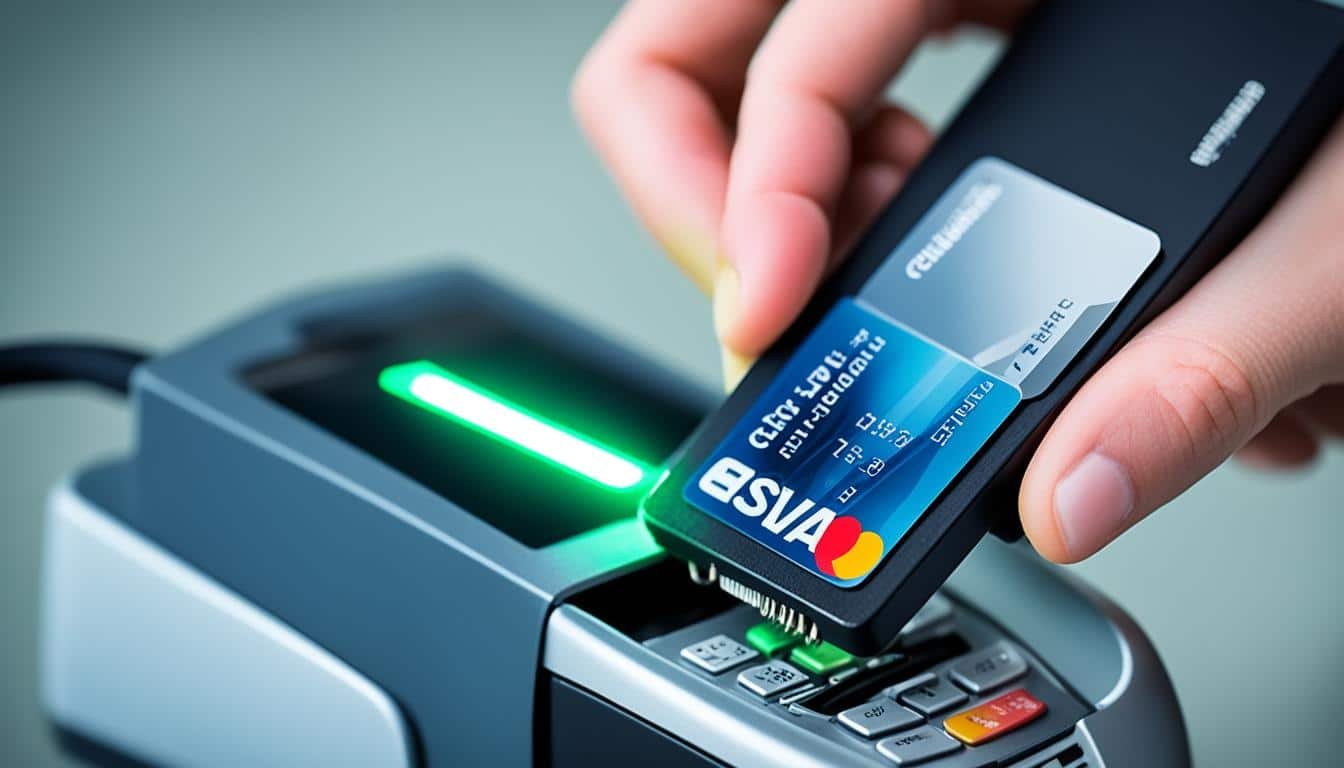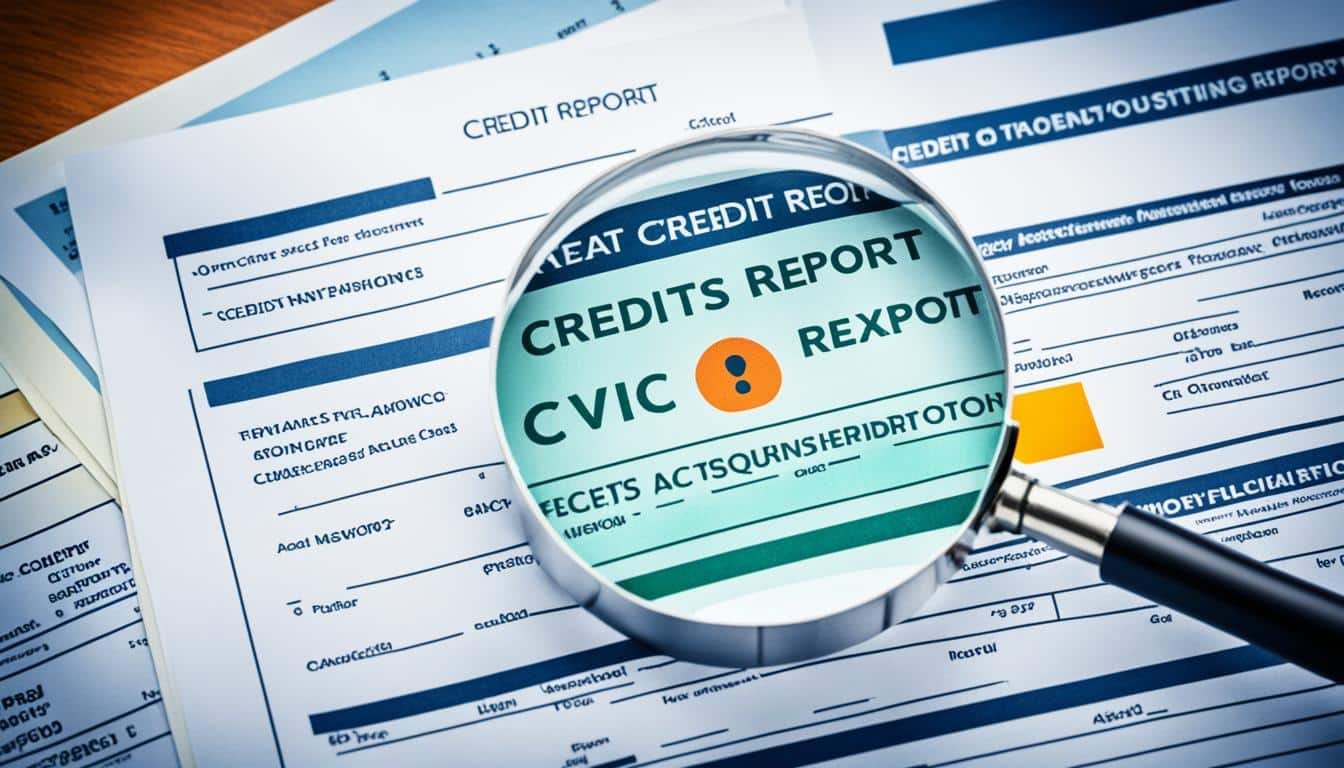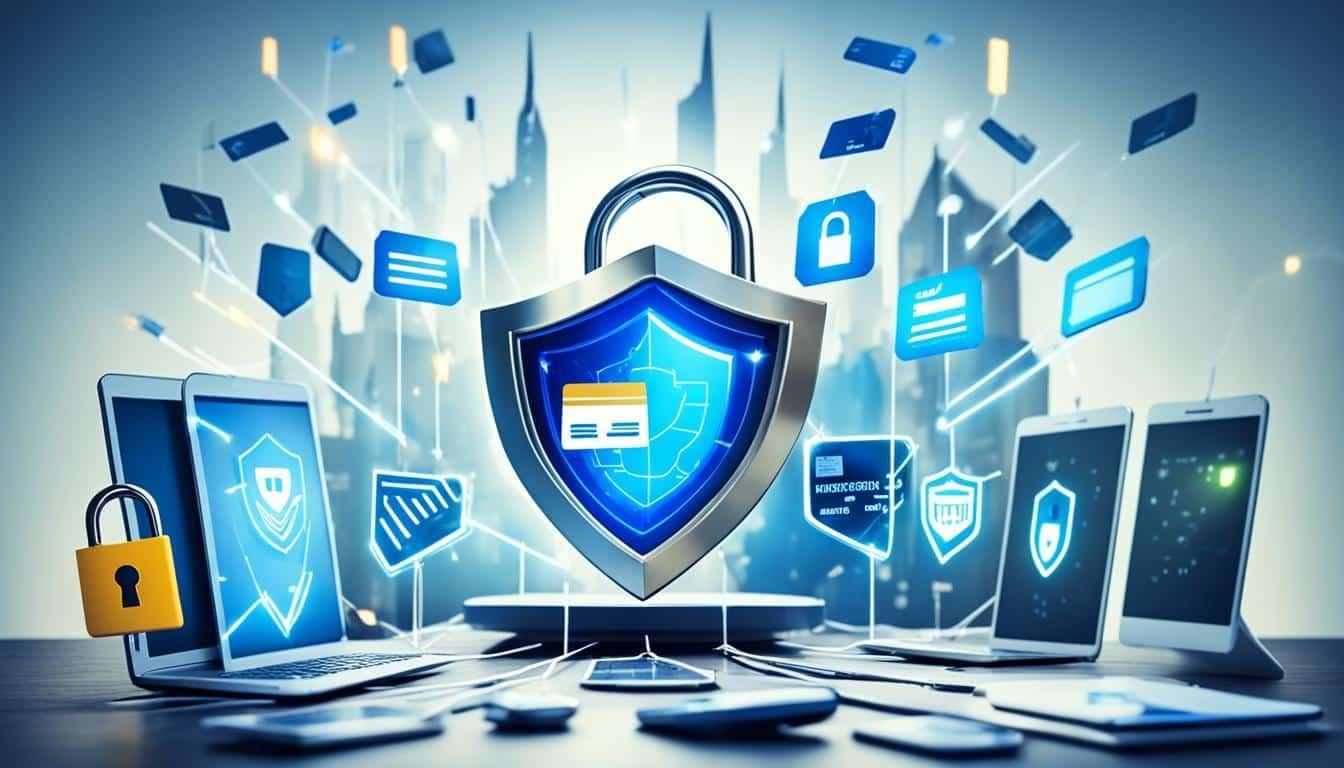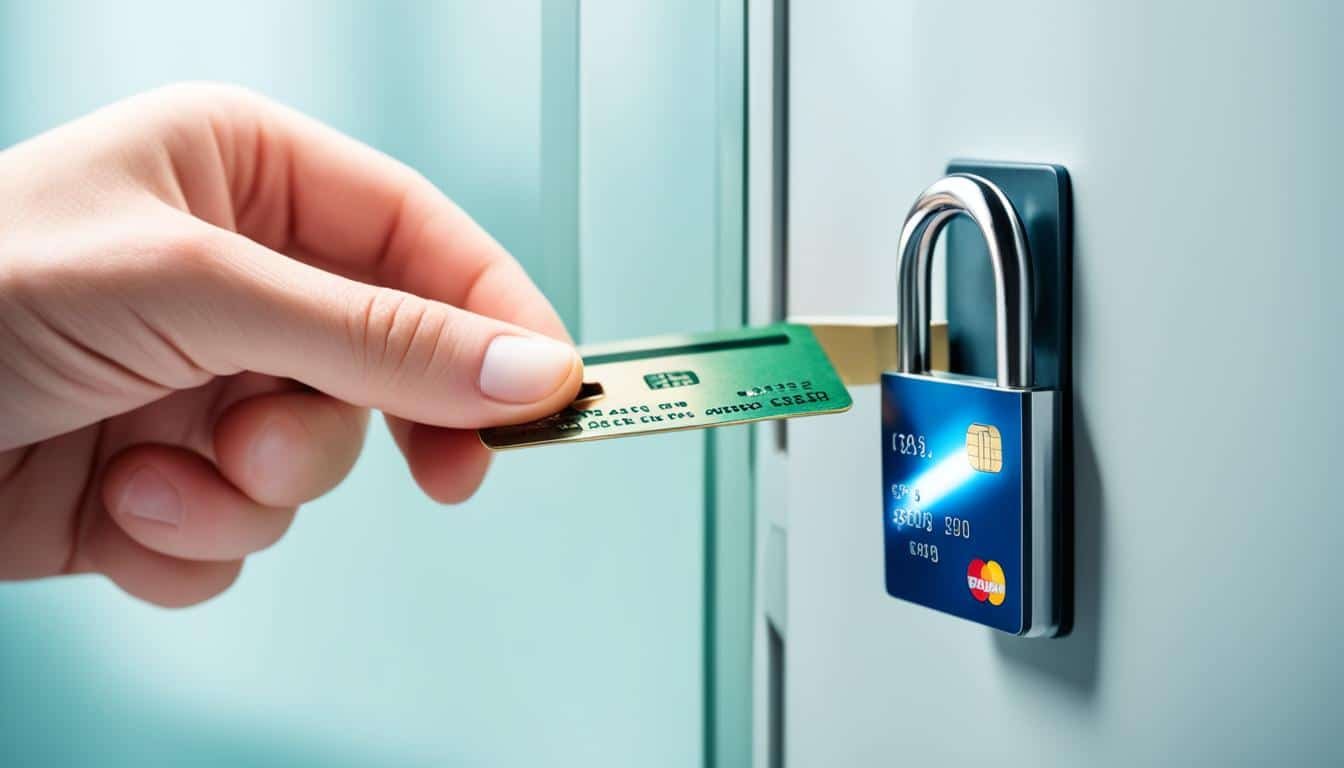Table of Contents
ToggleCredit Card Scams Protection is a sneaky way thieves get your card info to make unauthorized buys. They might go after your card in person or hack into your account online. This crime can cost you a lot of time and money, increase your debt, and hurt your credit score.
There are many ways thieves commit credit card fraud. They might apply for a card in your name, send fake emails to steal your info, copy your card details, take over your account, or steal your card. It’s crucial to know how to spot and stop these scams.
Key Takeaways
- Credit card fraud can take many forms, including physical and digital theft of your information.
- The consequences of credit card fraud can be significant, including financial loss and damage to your credit.
- Educating yourself on the common types of credit card fraud and taking proactive steps to protect your information can help you avoid becoming a victim.
- Regularly monitoring your credit card statements and credit reports can help you detect and address any unauthorized activity quickly.
- Securing your online transactions and avoiding public Wi-Fi can further reduce your risk of credit card fraud.
Understanding Credit Card Fraud
Credit card fraud is a big problem that can cause a lot of harm. It means using a credit card or its info without permission for personal gain. This often leads to financial losses and can hurt your credit score. Knowing the different types of fraud and how they work is key to fighting it.
Also Read: Top Medical Equipment For Home Healthcare
Types of Credit Card Fraud
There are many ways fraudsters steal credit card info and commit fraud, such as:
- Credit Card Application Fraud: Thieves use stolen info to open new cards in your name.
- Phishing and Smishing Scams: They send fake emails, texts, or call to get your card details.
- Credit Card Skimming and Cloning: Criminals put devices on ATMs to capture your card info, then make fake cards.
- Credit Account Takeovers: They get into your account and make charges without your okay.
- Lost or Stolen Credit Cards: If your card gets stolen, it can be used by someone else for fraud.
Impact of Credit Card Fraud
Credit card fraud can really hurt you, both in your wallet and your feelings. You might see unauthorized charges, your credit score could get damaged, and fixing the problem takes a lot of time. It can also affect others, like merchants and consumers, by making things more expensive and leading to higher interest rates and stricter rules.
Also Read: What Are Personal Loan And How Do They Work?
“Credit card fraud is a growing problem that affects millions of people each year, costing billions in financial losses. Understanding the different types of fraud and their impact is the first step in protecting yourself and your finances.”
Protecting Against Phishing and Smishing Scams

Phishing and smishing scams are common ways people fall victim to credit card fraud and identity theft. These scams use fake emails, texts, or social media messages that look like they’re from trusted sources. They try to get you to share your personal and financial info.
Opening links or downloading attachments from these messages can put your devices at risk of getting malware and spyware. This can lead to more problems with your data. It’s important to know how to spot these scams to keep your info safe from credit card fraud and identity theft.
Also Read: Strategies For Loan Approval With Limited Credit History
Recognizing Phishing and Smishing Scams
- Be cautious of messages that make you feel rushed or need quick action.
- Watch out for spelling and grammar errors, which are often in fake messages.
- Make sure the sender’s email or phone number checks out as legitimate.
- Don’t click on links or download files from unknown or suspicious sources.
Protecting Yourself
- Don’t give out your personal or financial details to messages you didn’t ask for.
- Call the supposed source directly using a verified number or website to check if the message is real.
- Use antivirus and anti-malware tools to shield your devices from phishing and smishing threats.
- Keep your software and systems updated to have the latest security fixes.
“Phishing and smishing scams are always changing, so staying alert and learning about new tactics is key to beating social engineers.”
By knowing the signs of phishing and smishing scams and being proactive, you can lower your chances of falling into the trap of credit card fraud and identity theft.
Also Read: How Does A Quick Loan Differ From A Traditional Personal Loan?
Preventing Card Skimming and Cloning

Credit card skimming and cloning are big threats that people need to know about to keep their financial info safe. Skimming uses a small device, called a card skimmer, on real card readers at ATMs or gas pumps to grab card data. This info can make a cloned card for illegal buys.
Also Read: How Can Real Estate Be Used As Loan Security?
Identifying Card Skimmers
To spot a card skimmer, people should watch closely and check card readers for anything odd, like:
- Loose or wiggling card slots
- Extra parts that don’t belong
- Signs of someone messing with it or glue left behind
If a card reader looks fishy, it’s smart to skip it and tell the right people or the bank about it.
Safeguarding Against Card Cloning
Using EMV chip cards is a great way to stop card cloning. EMV tech makes it hard for crooks to make fake cards. But remember, EMV doesn’t help with card-not-present transactions, like buying online or over the phone without the card.
To keep safe from card cloning, check your credit card statements often for weird charges. If you see something fishy, tell your card company right away.
Monitoring Accounts for Unauthorized Activity

It’s key to keep an eye on your credit card account and check your monthly credit card statements often. This helps spot credit card fraud early. Always look for any charges you don’t recognize or seem odd. Many credit card issuers also have fraud alerts to tell you right away about possible credit card activity that’s not yours.
Also Read: How Can Real Estate Be Used As Loan Security?
Reviewing Credit Card Statements
Going through your credit card statements every month is a good way to watch your account for anything fishy. If you see charges you don’t remember, check them out right away. Spotting fraudulent activity early can really help lessen the harm from credit card fraud and keep your account secure.
Signing Up for Fraud Alerts
Many credit card issuers have fraud alert services that tell you right away if there’s something odd on your credit card account. By signing up for these alerts and acting fast, you can cut down the damage from credit card fraud a lot. This way, you’re being very proactive in keeping an eye on your credit card account and fighting fraud detection.
| Feature | Description |
|---|---|
| Credit Card Statement Review | Carefully examine monthly statements for any suspicious or unfamiliar charges. |
| Fraud Alerts | Real-time notifications from your credit card issuer about potential fraudulent activity. |
“Staying vigilant and proactive in monitoring your credit card accounts is one of the best defenses against fraud and unauthorized transactions.”
Securing Online Transactions

Online transactions are now a big part of our lives, from buying things online to making digital payments. It’s vital to keep these transactions safe to protect your personal info, like credit card numbers and personal details. Two important things to remember are using secure websites and staying away from public Wi-Fi.
Using Secure Websites
When you’re shopping online, make sure to use secure websites. These sites have “https” in their URL, which means your connection is safe and your data is protected. This encryption keeps your credit card info and other private details safe during your purchase.
Avoiding Public Wi-Fi
Public Wi-Fi might seem handy, but it’s not safe for your online transactions. These networks often aren’t secure, putting your devices and data at risk of theft and fraud. Don’t use public Wi-Fi for sensitive financial info or online shopping. Use a VPN or your own data plan for a safer connection instead.
Using secure websites and avoiding public Wi-Fi can greatly improve the safety of your online transactions. This way, you keep your personal and financial info safe.
Maintaining Credit Report Vigilance

Checking your credit reports often is key to fighting credit card fraud and identity theft. Look at your reports from Equifax, Experian, and TransUnion. This way, you can spot and fix any odd activity or new accounts you didn’t open.
If you find mistakes or signs of identity theft, act fast. You can dispute the info with the credit bureaus. Consider putting a credit freeze or credit lock on your reports to keep your credit safe.
Keeping an eye on your credit report helps protect you from fraud’s long-term effects. By checking your reports often and fixing any problems quickly, you keep your finances and identity safe.
Benefits of Credit Report Monitoring
- Early detection of unauthorized accounts or suspicious activity
- Ability to dispute inaccuracies and errors in your credit report
- Opportunity to place a credit freeze or credit lock to protect your credit
- Improved credit score management and financial health
For your credit report‘s safety, think about using a credit monitoring service. Or, check your reports from the three big credit bureaus on your own. Being alert helps you protect your money and identity.
credit card scams protection

Keeping your credit card information secure is key in fighting credit card fraud. By securing your card details, you lower your risk of fraud. This includes both physical and digital steps.
Keeping Card Information Secure
First, store your credit card safely, like in a wallet or purse. Don’t use your card on public Wi-Fi networks as they’re risky. Also, shred any documents with your credit card information before throwing them away.
Utilizing Additional Security Measures
- Choose strong, unique passwords for online accounts and use two-factor authentication if you can.
- Think about using virtual credit card numbers or mobile payment services for online buys. They offer more protection for your credit card information.
- Check your credit card statements and credit report often to spot and fix any unauthorized use.
By following these steps, you can greatly lower your chance of falling into credit card scams and fraud.
“The best way to protect your credit card information is to be proactive and vigilant in your security practices.”
Responding to Credit Card Fraud

If you think you’ve been a victim of credit card fraud, act fast to lessen the damage. The first step is to call your credit card company right away to report the credit card fraud. They will freeze your account and give you a new card to stop more unauthorized charges.
Notifying the Credit Card Issuer
When you see strange charges on your card, reach out to your credit card issuer quickly. Give them all the details you can, like when and where the fraud happened. They will start an investigation and protect your money.
Placing a Fraud Alert
After telling your credit card company, think about setting a fraud alert with one of the big credit bureaus – Experian, Equifax, or TransUnion. This tells lenders to be extra careful when checking your identity for new accounts. It helps stop more identity theft and credit card fraud.
Telling the Federal Trade Commission (FTC) or the Consumer Financial Protection Bureau (CFPB) about the fraud can help too. They offer advice and tools to deal with credit card fraud.
Checking your credit reports often and fixing any mistakes is key to keeping your finances safe. By acting quickly and taking steps to fight credit card fraud, you can reduce the harm and protect your money.
Also Read : What Are The Risks Of High Credit Utilization?
Conclusion
Keeping your credit card safe from scams is key to protecting your money. Learn about the different fraud types, watch out for phishing and skimming, and keep an eye on your accounts. Using extra security steps can lower your risk of getting scammed.
When you act fast if you think something’s wrong, you can lessen the damage from fraud. This article shared ways to keep your credit card info and personal details safe from scams. By following these tips, you can use digital payments safely.
It’s important to focus on preventing credit card fraud and keeping your financial info secure. By doing so, you can enjoy using your credit cards without worrying about scams. Always use a mix of strategies to protect your financial future.
FAQs
Q: How can I prevent credit card fraud effectively?
A: To prevent credit card fraud, you should regularly monitor your credit accounts, use secure websites for transactions, enable two-factor authentication, and keep your personal information private. Additionally, consider using the best credit cards that offer enhanced fraud protection features.
Q: What should I do if I need to report credit card fraud?
A: If you need to report credit card fraud, contact your card issuer immediately to report unauthorized transactions. You should also file a report with the Federal Trade Commission (FTC) and consider placing a fraud alert with one of the three major credit bureaus.
Q: What are the best credit cards for fraud protection?
A: The best credit cards for fraud protection often include features such as 0 fraud liability, real-time alerts for suspicious transactions, and advanced security measures. Research various card offers to find one that best suits your needs.
Q: What should I do if I become a victim of credit card fraud?
A: If you’re a victim of credit card fraud, immediately report the fraudulent activity to your card issuer, change your account numbers, and monitor your credit report for any unusual activity. You may also want to file a report with the FTC.
Q: How can I protect myself from credit card and identity theft?
A: To protect yourself from credit card and identity theft, regularly review your credit report, use strong passwords, avoid sharing sensitive information publicly, and utilize services that help you protect against credit card fraud.
Q: Are debit cards safer than credit cards to use?
A: While both debit and credit cards have their risks, credit cards often provide better fraud protection features, such as 0 fraud liability. Using a credit card can help you protect yourself from credit card fraud more effectively compared to a debit card.
Q: What does the Fair Credit Billing Act entail regarding fraud protection?
A: The Fair Credit Billing Act provides consumers with protections against unauthorized transactions and billing errors. It allows you to dispute charges and limits your liability for fraudulent credit card transactions to a maximum of $50, provided you report them promptly.
Q: How often should I monitor my credit report?
A: It is advisable to review your credit report at least once a year, but more frequent monitoring can help you quickly spot any fraudulent activity or errors. Consider obtaining a copy of your credit report from each of the three major credit bureaus annually.
Q: What are common types of credit card fraud?
A: Common types of credit card fraud include card-not-present fraud, account takeover, and card skimming. Fraud can happen through various means, so being aware of these types can help you take steps to protect yourself against credit card fraud.





